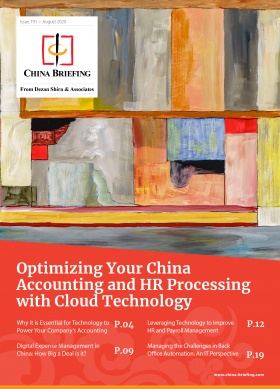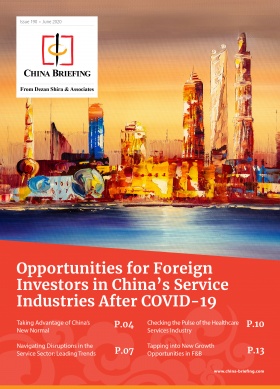Hainan Announces First QFLP Fund, Insurance to Cover Foreign Anti-Cancer Drugs
- China is piloting the qualified foreign limited partner and qualified domestic limited partner systems in Hainan province to facilitate market access and liquidity options for foreign individual and institutional investors as well as domestic investors.
- The Boao Lecheng International Medical Tourism Pilot Zone in Hainan Province has launched a special drug insurance that covers 70 anti-cancer drugs, including 49 medicines not yet approved for sale anywhere else in China.
- Hainan increased its annual tax-free shopping quota per person and expanded the duty-free products list from 38 categories to 45, now including electronic products. Three new duty free stores will open in Sanya.
On June 1, 2020, the Central Committee of the Communist Party of China and the State Council issued the Overall Plan for the Construction of Hainan Free Trade Port, also called “Master Plan”, thus marking a further opening-up of the Chinese economy to foreign investors. The free trade port (“FTP”) – that shall be established by 2025 and completed by 2035 – will be regulated by specific policies and regulations that will implement the principles set under the Master Plan, which provide the guidelines for the establishment of the Hainan FTP.
Based on the principles set under the Master Plan, the free trade port will be characterized by a smooth flow of key production factors, supported by tailored taxation mechanisms, efficient social governance, and rule of law.
Since the beginning of 2020, competent Chinese authorities have adopted several regulations and policies to meet the goals set under the Master Plan. These include recent interventions to facilitate foreign investments and boost the medical and tourism sectors, such as through the introduction of a special insurance scheme in Hainan Medical Tourism Zone and expanded duty free quota.
Qualified foreign limited partner and qualified domestic limited partner systems
The Chinese government will pilot qualified foreign limited partner (“QFLP”) and qualified domestic limited partner (“QDLP”) systems in Hainan province, marking a significant breakthrough in terms of the existing foreign exchange control system in China.
- The QFLP system allows foreign individual and institutional investors to invest in Chinese assets through fund managers, while the QDLP gives foreign investment access to domestic investors.
- The QDLP system is currently available in Beijing and Shanghai, while the QFLP was first implemented on a trial basis in other cities including, but not limited to, Shanghai, Shenzhen, and Tianjin.
The first QFLP fund in Hainan
The QFLP system allows foreign investors to form an onshore RMB fund to invest in private Chinese companies. The foreign investor(s) need to first set up a foreign management entity onshore, then, after having set up the QFLP fund, it will be able to raise money from both domestic and international investors (the foreign currency is converted into RMB).
In September this year, the first QFLP fund – BOCOM International Kechuang Shengxing QFLP Equity Investment Fund – was established in Haikou Jiangdong New Area by subsidiaries of the Chinese Bank of Communications, namely, BOCOM International Holdings and BOCOM International Equity Investment Management. The new structure aims to support the development of innovative high-tech enterprises in the fields of finance, information technology, financial technology, high-end equipment, and more, with a capital equal to about US$100 million.
Hainan is speeding up the formulation and promulgation of interim rules for QFLPs. Market watchers suspect that QFLP companies will have no minimum access threshold for registration, with foreign investors enjoying the same treatment as domestic investors – though the rules and clarity on this front are awaited. Meanwhile, the local bureau will apply for support from the State Administration of Foreign Exchange, to publish the pilot rules for QDLPs within 2020 itself.
Special anti-cancer medicine insurance
The Boao Lecheng International Medical Tourism Pilot Zone in Hainan Province launched a special drug insurance, effective from October 1, 2020, that will cover 70 anti-cancer drugs for 35 common types of cancer, of which 49 medicines are yet to be approved for sale in the Chinese mainland market.
The annual premium for Hainan residents is RMB 29 (US$4.27), while the insurance covers up to RMB 1 million (US$147.271) in drug costs. Residents from other parts of the Chinese mainland are eligible to purchase the insurance with an annual premium ranging roughly from RMB 40 (US$5.89) to RMB 1,300 (US$191.45).
This policy is relevant for both, foreign companies and local residents. Foreign firms will get an easier access to the market, while the patients – who usually have to wait five to 10 years before foreign medicines get the government’s approval – will now be able to buy such drugs immediately.
In addition, another advantage for residents in China is that the insurance (introduced in Hainan) does not require any specific health conditions, nor any physical examination or health notification to qualify for coverage. A similar insurance policy is expected to be introduced across China, but the premium will be adjusted based on different factors, such as the age of the insured person and his/her health conditions.
Expansion of duty free policy
From July 1, 2020, a new duty free policy has been rolled out in Hainan, increasing the annual tax-free shopping quota from RMB 30,000 (US$4.418) to RMB 100,000 (US$14.727) per person and, expanding the duty-free products list from 38 categories to 45, thus including electronic products among the newly added items.
Since the promulgation of the above-mentioned policy, Hainan recorded a surge in spending in duty free shopping, especially on cosmetics, watches, and jewels, amounting up to RMB 8.61 billion (US$1.268 billion) until September 30, 2020.
Considering the increase in sales, the local government has decided to open three other duty free shops that will be located in the resort city of Sanya, beyond the four already existing shops – two located in Haikou, one in Sanya, and another one in Boao.
Hainan FTP role in the international context
Since 2018, when the Haikou Jiandong New District of China (Hainan) Pilot Free Trade Zone was announced, important progress has been made in order to ensure the zone’s openness to international trade and investments, to improve the legal environment regulation and financial services, as well as in laying the foundation of the Hainan FTP.
The Master Plan, once it will be fully implemented via specific policies, will likely reshape foreign investments, not only in China but in Southeast Asia as well, allowing Hainan FTP to compete with other international free trade ports, such as Singapore and Hong Kong. However, the potential of Hainan FTP is yet to be displayed, considering that further regulations will need to be promulgated to fully implement the Master Plan. What is already evident is China’s intent to transform Hainan into a hub characterized by broad market access, regulatory transparency, port logistics, and tax incentives, all of which will enable it to effectively challenge regional rivals.
About Us
China Briefing is written and produced by Dezan Shira & Associates. The practice assists foreign investors into China and has done so since 1992 through offices in Beijing, Tianjin, Dalian, Qingdao, Shanghai, Hangzhou, Ningbo, Suzhou, Guangzhou, Dongguan, Zhongshan, Shenzhen, and Hong Kong. Please contact the firm for assistance in China at china@dezshira.com.
We also maintain offices assisting foreign investors in Vietnam, Indonesia, Singapore, The Philippines, Malaysia, Thailand, United States, and Italy, in addition to our practices in India and Russia and our trade research facilities along the Belt & Road Initiative.
- Previous Article Why is China Introducing New Export Controls?
- Next Article Die führenden Trends im chinesischen Dienstleistungssektor nach der Beeinträchtigung durch COVID-19










